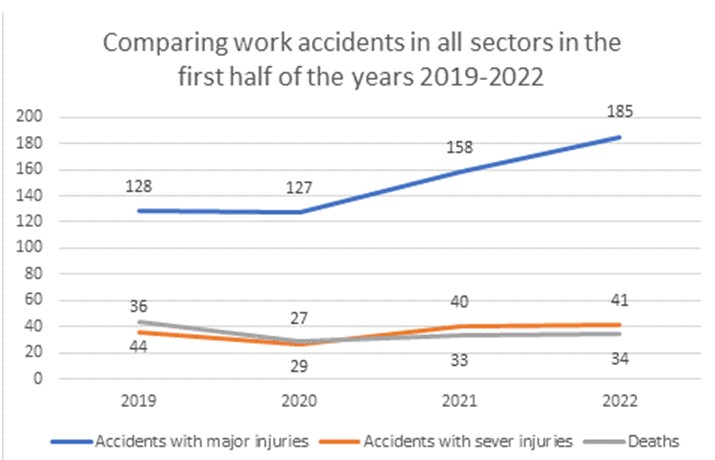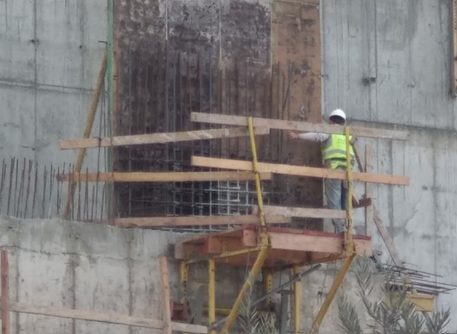Below are the findings from Workers’ Hotline’s (Kav La’Oved) mid-year report on work accidents for 2022:
- During the first half of 2022 the number of accidents that caused medium and severe accidents was the highest in the last four years, the number of fatalities increased, and the most fatal accidents occurred in June. Even today, medium and severe accidents are rarely investigated by the responsible authorities.
- Thirty-four workers lost their lives in workplace accidents during the first half of 2022 (the last one died mere hours before closing the report on June 30th). Almost half (44%) were in the construction sector. Mortality in the agricultural sector was more than four times higher than in the corresponding period of the previous two years (9 compared to 2), out of them, five died in a work vehicle flipping over.
- The main causes for lethal workplace accidents in the first half of 2022 – across all sectors – were falling from heights (44%) and work vehicle injuries (25%).
- The Occupational Health and Safety Administration issued 1,742 safety orders during the first half of 2022. The main violations cited across sectors, were related to electricity, elevators, and water tanks (468 orders overall). For most orders, there was no cause cited for the safety order (921 orders). Of the total number of orders issued so far in 2022, more than 75% were issued in the construction sector (1,341).
- As of today, 60 inspectors are assigned to construction sector, and only 10 to all other sectors and issues handled by the OSH Administration.
- The Municipalities with the highest number of workplace accidents in the first half of 2022 were Tel Aviv (15), Haifa (14), Ramla (11) and Petah Tikva (10), but there is no correlation with the number of safety orders issued in these cities). There is insufficient cooperation between municipalities and the OSH Administration, and municipal inspectors generally do not address workplace safety issues.
- Despite the pledge made by the government back in November 2018 to take operative measures to ensure workers’ safety in the construction sector, which accounts for about half of workplace accidents in Israel, most of the commitments remain on paper.
- The absence of a national authority for workplace safety that would coordinate public policy in all sectors and set priorities according to the economy’s needs, is one of the main reasons underling the low safety standards in the Israel.
 Kav LaOved recommends taking several urgent actions to reduce the number of workplace accidents:
Kav LaOved recommends taking several urgent actions to reduce the number of workplace accidents:- The establishment of a National Authority for Workplace Safety and Occupational Health, as per the recommendations made by the Adam Committee in 2014.
- Compliance with the State’s 2018 pledge to the Histadrut (e.g. compulsory installation of safety nets while working in heights, expanding the Registrar of Contractors to apply more administrative sanctions towards safety violators, and extending criminal liability to apply to contractors and companies commissioning the construction).
- Enforcement and application of existing legal sanctions, to achieve real and substantive deterrence, as well as effective investigation of all workplace accidents (including medium- and sever ones).
This report is dedicated to all those who lost their lives in 2022, and to those injured in workplace accidents whose lives will never be the same again.


